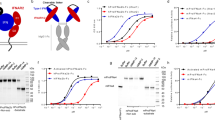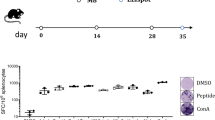Abstract
Interferon-alpha (IFN-α) has strong antitumor effects, and IFN-α gene therapy has been used clinically against some cancers. In this study, we evaluated the efficacy of the combination of IFN-α-transduced tumor cell vaccines and programmed cell death 1 (PD-1) blockade, and investigated the mechanisms of the antitumor effects of the combined therapy. A poorly immunogenic murine colorectal cancer cell line, MC38, was transduced to overexpress IFN-α. In a therapeutic model, parental tumor-bearing mice were inoculated with MC38-IFNα cells and an anti-PD-1 antagonistic antibody. Analyses of immunohistochemistry and tumor-specific lysis were performed. The outgrowth of the established tumors was significantly reduced in mice treated with the combination of IFN-α and anti-PD-1. Immunohistochemical analyses of the therapeutic model showed marked infiltration of CD4+ cells and CD8+ cells in the established MC38 tumors of mice treated with both IFN-α and anti-PD-1. Significant tumor-specific cytolysis was detected when splenocytes of mice that were treated with both IFN-α and anti-PD-1 were used as effector cells. These results suggest that blockade of the PD-1 PD-ligand enhanced the Th1-type antitumor immune responses induced by IFN-α. The combination of IFN-α gene-transduced tumor cell vaccines and PD-1 blockade may be a possible candidate for a cancer vaccine for clinical trials.
This is a preview of subscription content, access via your institution
Access options
Subscribe to this journal
Receive 12 print issues and online access
$259.00 per year
only $21.58 per issue
Buy this article
- Purchase on Springer Link
- Instant access to full article PDF
Prices may be subject to local taxes which are calculated during checkout




Similar content being viewed by others
References
O’Connell J, Bennett MW, O’Sullivan GC, Collins JK, Shanahan F . The Fas counterattack: cancer as a site of immune privilege. Immunol Today 1999; 20: 46–52.
Bronte V, Serafini P, Apolloni E, Zanovello P . Tumor-induced immune dysfunctions caused by myeloid suppressor cells. J Immunother 2001; 24: 431–446.
Chen L, Linsley PS, Hellstrom KE . Costimulation of T cells for tumor immunity. Immunol Today 1993; 14: 483–486.
Colombo MP, Forni G . Cytokine gene transfer in tumor inhibition and tumor therapy: where are we now? Immunol Today 1994; 15: 48–51.
Musiani P, Modesti A, Giovarelli M, Cavallo F, Colombo MP, Lollini PL et al. Cytokines, tumour-cell death and immunogenicity: a question of choice. Immunol Today 1997; 18: 32–36.
Eguchi J, Kuwashima N, Hatano M, Nishimura F, Dusak JE, Storkus WJ et al. IL-4-transfected tumor cell vaccines activate tumor-infiltrating dendritic cells and promote type-1 immunity. J Immunol 2005; 174: 7194–7201.
Juang Y, Lowther W, Kellum M, Au WC, Lin R, Hiscott J et al. Primary activation of interferon A and interferon B gene transcription by interferon regulatory factor 3. Proc Natl Acad Sci USA 1998; 95: 9837–9842.
Marie I, Durbin JE, Levy DE . Differential viral induction of distinct interferon-alpha genes by positive feedback through interferon regulatory factor-7. EMBO J 1998; 17: 6660–6669.
Okada H, Villa L, Attanucci J, Erff M, Fellows WK, Lotze MT et al. Cytokine gene therapy of gliomas: effective induction of therapeutic immunity to intracranial tumors by peripheral immunization with interleukin-4 transduced glioma cells. Gene Ther 2001; 8: 1157–1166.
Belardelli F . Role of interferons and other cytokines in the regulation of the immune response. APMIS 1995; 103: 161–179.
von Hoegen P, Zawatzky R, Schirrmacher V . Modification of tumor cells by a low dose of Newcastle disease virus. III Potentiation of tumor-specific cytolytic T cell activity via induction of interferon-alpha/beta. Cell Immunol 1990; 126: 80–90.
Hiroishi K, Tuting T, Lotze MT . IFN-alpha-expressing tumor cells enhance generation and promote survival of tumor-specific CTLs. J Immunol 2000; 164: 567–572.
Eguchi J, Hiroishi K, Ishii S, Mitamura K . Interferon-alpha and interleukin-12 gene therapy of cancer; interferon-alpha induces tumor-specific immune responses while interleukin-12 stimulates non-specific killing. Cancer Immunol Immunother 2003; 52: 378–386.
Eguchi J, Hiroishi K, Ishii S, Baba T, Matsumura T, Hiraide A et al. Interleukin-4 gene transduced tumor cells promote a potent tumor-specific Th1-type response in cooperation with interferon-alpha transduction. Gene Ther 2005; 12: 733–741.
Ishida Y, Agata Y, Shibahara K, Honjo T . Induced expression of PD-1, a novel member of the immunoglobulin gene superfamily, upon programmed cell death. EMBO J 1992; 11: 3887–3895.
Day CL, Kaufmann DE, Kiepiela P, Brown JA, Moodley ES, Reddy S et al. PD-1 expression on HIV-specific T cells is associated with T-cell exhaustion and disease progression. Nature 2006; 443: 350–354.
Petrovas C, Casazza JP, Brenchley JM, Price DA, Gostick E, Adams WC et al. PD-1 is a regulator of virus-specific CD8+ T cell survival in HIV infection. J Exp Med 2006; 203: 2281–2292.
Trautmann L, Janbazian L, Chomont N, Said EA, Gimmig S, Bessette B et al. Upregulation of PD-1 expression on HIV-specific CD8+ T cells leads to reversible immune dysfunction. Nat Med 2006; 12: 1198–1202.
Urbani S, Amadei B, Tola D, Massari M, Schivazappa S, Missale G et al. PD-1 expression in acute hepatitis C virus (HCV) infection is associated with HCV-specific CD8 exhaustion. J Virol 2006; 80: 11398–11403.
Penna A, Pilli M, Zerbini A, Orlandini A, Mezzadri S, Sacchelli L et al. Dysfunction and functional restoration of HCV-specific CD8 responses in chronic hepatitis C virus infection. Hepatology 2007; 45: 588–601.
Boettler T, Panther E, Bengsch B, Nazarova N, Spangenberg HC, Blum HE et al. Expression of the interleukin-7 receptor alpha chain (CD127) on virus-specific CD8+ T cells identifies functionally and phenotypically defined memory T cells during acute resolving hepatitis B virus infection. J Virol 2006; 80: 3532–3540.
Boni C, Fisicaro P, Valdatta C, Amadei B, Di Vincenzo P, Giuberti T et al. Characterization of hepatitis B virus (HBV)-specific T-cell dysfunction in chronic HBV infection. J Virol 2007; 81: 4215–4225.
Blank C, Kuball J, Voelkl S, Wiendl H, Becker B, Walter B et al. Blockade of PD-L1 (B7-H1) augments human tumor-specific T cell responses in vitro. Int J Cancer 2006; 119: 317–327.
Fourcade J, Kudela P, Sun Z, Shen H, Land SR, Lenzner D et al. PD-1 is a regulator of NY-ESO-1-specific CD8+ T cell expansion in melanoma patients. J Immunol 2009; 182: 5240–5249.
Iwai Y, Ishida M, Tanaka Y, Okazaki T, Honjo T, Minato N . Involvement of PD-L1 on tumor cells in the escape from host immune system and tumor immunotherapy by PD-L1 blockade. Proc Natl Acad Sci USA 2002; 99: 12293–12297.
Blank C, Brown I, Peterson AC, Spiotto M, Iwai Y, Honjo T et al. PD-L1/B7H-1 inhibits the effector phase of tumor rejection by T cell receptor (TCR) transgenic CD8+ T cells. Cancer Res 2004; 64: 1140–1145.
Ahmadzadeh M, Johnson LA, Heemskerk B, Wunderlich JR, Dudley ME, White DE et al. Tumor antigen-specific CD8 T cells infiltrating the tumor express high levels of PD-1 and are functionally impaired. Blood 2009; 114: 1537–1544.
Gehring AJ, Ho ZZ, Tan AT, Aung MO, Lee KH, Tan KC et al. Profile of tumor antigen-specific CD8 T cells in patients with hepatitis B virus-related hepatocellular carcinoma. Gastroenterology 2009; 137: 682–690.
Dong H, Strome SE, Salomao DR, Tamura H, Hirano F, Flies DB et al. Tumor-associated B7-H1 promotes T-cell apoptosis: a potential mechanism of immune evasion. Nat Med 2002; 8: 793–800.
Gao Q, Wang XY, Qiu SJ, Yamato I, Sho M, Nakajima Y et al. Overexpression of PD-L1 significantly associates with tumor aggressiveness and postoperative recurrence in human hepatocellular carcinoma. Clin Cancer Res 2009; 15: 971–979.
Thompson RH, Dong H, Lohse CM, Leibovich BC, Blute ML, Cheville JC et al. PD-1 is expressed by tumor-infiltrating immune cells and is associated with poor outcome for patients with renal cell carcinoma. Clin Cancer Res 2007; 13: 1757–1761.
Zhang L, Gajewski TF, Kline J . PD-1/PD-L1 interactions inhibit antitumor immune responses in a murine acute myeloid leukemia model. Blood 2009; 114: 1545–1552.
Mumprecht S, Schurch C, Schwaller J, Solenthaler M, Ochsenbein AF . Programmed death 1 signaling on chronic myeloid leukemia-specific T cells results in T-cell exhaustion and disease progression. Blood 2009; 114: 1528–1536.
Sakuishi K, Apetoh L, Sullivan JM, Blazar BR, Kuchroo VK, Anderson AC . Targeting Tim-3 and PD-1 pathways to reverse T cell exhaustion and restore anti-tumor immunity. J Exp Med 2010; 207: 2187–2194.
Hiroishi K, Tuting T, Tahara H, Lotze MT . Interferon-alpha gene therapy in combination with CD80 transduction reduces tumorigenicity and growth of established tumor in poorly immunogenic tumor models. Gene Ther 1999; 6: 1988–1994.
Ishii S, Hiroishi K, Eguchi J, Hiraide A, Imawari M . Dendritic cell therapy with interferon-alpha synergistically suppresses outgrowth of established tumors in a murine colorectal cancer model. Gene Ther 2006; 13: 78–87.
Yu P, Steel JC, Zhang M, Morris JC, Waldmann TA . Simultaneous blockade of multiple immune system inhibitory checkpoints enhances antitumor activity mediated by interleukin-15 in a murine metastatic colon carcinoma model. Clin Cancer Res 2010; 16: 6019–6028.
Acknowledgements
We thank Ms Tomoe Shimazaki and Ms Hisako Nozawa for technical assistance. This study was supported in part by a Grant-in-Aid for Young Scientists (B) from the Ministry of Education, Culture, Sports, Science and Technology of Japan for JE; a Grant-in-Aid for Scientific Research (C) from the Ministry of Education, Culture, Sports, Science and Technology of Japan; and a grant from the Ministry of Health, Labor, and Welfare of Japan for KH.
Author information
Authors and Affiliations
Corresponding author
Ethics declarations
Competing interests
The authors declare no conflict of interest.
Rights and permissions
About this article
Cite this article
Omori, R., Eguchi, J., Hiroishi, K. et al. Effects of interferon-α-transduced tumor cell vaccines and blockade of programmed cell death-1 on the growth of established tumors. Cancer Gene Ther 19, 637–643 (2012). https://doi.org/10.1038/cgt.2012.42
Received:
Revised:
Accepted:
Published:
Issue Date:
DOI: https://doi.org/10.1038/cgt.2012.42
Keywords
This article is cited by
-
Interferon regulatory factor 1 priming of tumour-derived exosomes enhances the antitumour immune response
British Journal of Cancer (2018)
-
Aspirin enhances IFN-α-induced growth inhibition and apoptosis of hepatocellular carcinoma via JAK1/STAT1 pathway
Cancer Gene Therapy (2013)



